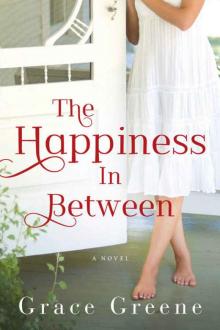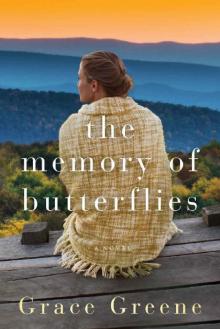- Home
- Grace Greene
The Memory of Butterflies: A Novel Page 12
The Memory of Butterflies: A Novel Read online
Page 12
CHAPTER FIVE
On a sunny day during the summer that Ellen was three, she cut her knee on a sharp rock. It was more of a scrape really, but she screamed so loudly that Gran and I nearly had heart failure as we searched her for bites or wounds, perhaps hidden under her clothing and probably scaring her more, before we figured out it was nothing and could be easily fixed with a little soap, ointment, a bandage, and a kiss “to make it all well.”
Gran insisted I scour the yard for obvious things like nails or broken glass that could pose a risk to little feet and hands and knees. Ellen, already recovered, was out and helping. Her help consisted of walking around with a stick, stumbling over roots, and generally being a busy little three-year-old girl.
As I searched the hillside near the cemetery, I heard a stone dislodge and tumble down. I turned and ran immediately to the cemetery wall.
I grabbed Ellen as another loose stone slipped from under her foot. I caught her under her arms, let her stand for a moment on the top of the wall while I secured my arms around her, and hugged her. I wanted her to be careful but not fearful.
She pointed at the smallest grave with its ring of rocks. “Ellen can play?”
I tightened my arms around her. “Not here, sweet girl. This is our family cemetery.” How to explain it? No way that I could think of. “Not for playing.” The headstones went in a row straight across—my parents, Anne Marie and Sean, and their date of death on a homemade headstone with their names scratched in while it was still wet. I’d thought it was odd that their last name wasn’t included but long ago realized that being homemade, probably by Grand, it was no wonder if it wasn’t quite what you’d find in a city cemetery. Next to Anne Marie was the first Ellen, next was Grand, and then the spot where Gran would rest.
“Too tight, Mommy. Ellen get down now.”
She squirmed, and I held her up, kissing her cheek with a blubbery noise to make it fun, then I set her down, letting her get her feet under her before releasing her.
How could I explain loss and burial to a child of this age? The word Daddy was a bit of a minefield anyway. She’d asked for him, simply saying, “Daddy?” a few times early on. But she hadn’t persisted. She hadn’t said it in a while. What could I tell her? Someday, perhaps not too far off, she might begin to ask with persistence.
Mommy hadn’t been a problem. Not since I started answering to it.
Hand in hand, we crossed the bridge over the creek, but as soon as I let her go, she wandered over to the toolshed. The door wasn’t latched, and her little fingers fit into the gap easily, and it swung open.
“Stay out of the shed, Ellen. There’s sharp stuff in there.”
But she leaned inside anyway and came out with a bright-blue pot. The butterfly pot. I had no idea how it had ended up in the shed. I understood why it attracted her. The pain that shot through me at the sudden memory was undeniable but manageable. I made a point of smiling so Ellen wouldn’t misread my expression.
“Bring it over here.” I held it in my hands and turned it over and moved my finger around the outer edges of the wings. Her name, my daughter’s name, was scratched into the side. Ellen.
“Butterfly, Mommy?”
“Yes, sweetheart. A butterfly pot. I made it long ago.” I smiled, saying, “Come with me.”
I held her hand as we stepped over the tree roots and other natural tripping hazards I couldn’t move out of the way. Ellen was at an age where she needed constant watching, and Gran wasn’t up to it, thus I hadn’t been inside the pottery cabin in a long time. It could wait. This Ellen, our sweet Ellen, had been with us for more than a year now and had already grown so much that at this rate, it wouldn’t be long before she would be a full-fledged child and ready for school. I didn’t know what I’d do about it when the time came.
“What is it, Mommy?”
Had she read my expression? No, she was pointing at the pottery cabin.
“That’s where Mama used to make her pretties.”
I opened the door, surprised it moved easily, as if the many yesterdays meant little. Inside it was dusty, and webs hung in the corners and rafters, but it was dry and smelled clean despite the disuse.
The potter’s wheel sat where I’d last used it. I ran a finger in the layer of dirt and dust that had settled over it. Nearby was the table for working the clay, and against the wall was a cabinet where I’d stored supplies. Time hadn’t stood still here. The clay was hard, and the glazes were dried up and cracked.
Other than halfhearted attempts at clay sculpture after our loss, I’d let this all go.
“What’s this, Mama?” Ellen was trying to spin the wheel.
“It’s where I make clay pots.”
“The butterfly pot?”
“Partly there, and then I finished it by hand.”
She set the pot carefully on the wheel, then tried to climb onto the seat via her belly. For a moment, I thought she’d overbalance and fall headfirst. I was ready to grab her, but she made it, pulling her legs around and ending up on her butt.
“It’s dusty.” I lifted her legs and checked around underneath the seat and wheel to make sure no spiders were lurking. “All clear.”
“Show me how?” She looked up, her eyes adding weight to her question.
“I don’t have any good clay. Besides, your hands are small . . .” I let that trail off. “I don’t have any good clay.”
“Show me. Please?”
I came up behind her and sat on the back edge of the seat with her sitting between my legs. She’d grown so much that I was more off than on the seat.
I took her hands in mine. “We can pretend. Will that work?”
She nodded.
How much should I show a curious three-year-old? Likely she’d lose interest quickly, but a turning wheel would have far too much potential for temptation. I said, “Pretend the wheel is spinning.”
“Spinning?”
“Yes.” I cupped her hands in mine and held them over the butterfly pot. “And that this is a lump of clay, gray and like mud.”
“It’s a bowl, Mommy. A pretty blue bowl. A butterfly bowl.”
“True. But before it was a pretty blue bowl, it was a lump of gray mud. Clay. Can you pretend that’s what it looks like now?”
She shook her head no, but she said, “Yes.” Her dark, glossy hair smelled fresh and clean. I kissed the part on the top of her head, and she giggled.
“Listen carefully,” I said. “We hold our hands like this. We don’t touch the wheel because it’s spinning, right? Pretend spinning, I mean.”
She nodded. The tension was building in her hands, and her small fingers were tight.
“Now this is important. You have to relax because if you don’t, the clay will get confused because your brain won’t be able to communicate its happy thoughts through your hands and fingers, right?”
“K.”
“Pretend the wheel is spinning and the blue bowl is, too, and you put two fingers from this hand inside and a knuckle on the outside from the other hand, and you pull up ever so gently, and the clay shapes itself bit by bit between your fingers as you move. Can you feel that?”
“I can. I can do it myself. Like rubbing Gran’s fingers.”
I chuckled softly. “Gran’s fingers?”
“When they hurt, Mommy. Gentle, she says, when I put the medicine on them.” She crinkled her nose and shuddered dramatically. “Stinky.”
“The medicine is stinky? Yes, I suppose it is, but it makes her hands feel better. And yes, gentle like when you put the medicine on Gran’s fingers. Exactly like that, my very smart girl.” My arms moved to embrace her.
She wiggled against my hug. “Mommy, I can’t make the bowl with you hugging tight.”
I kissed her ear. “Or without proper clay, either. How about if I get us some fresh clay to work with?”
“K.”
How could one letter, one syllable, represent a little one’s laughter, the shining eyes, and the excitement, almos
t like a vibration in her being? I didn’t want to let her down.
“It’ll take a little while before we can do it, but I promise we’ll make bowls together.”
“Thank you, Mommy.” She wiggled off the seat. “Can I take my blue bowl to show Gran?”
“Yes, ma’am, you may.”
I watched her strong, young legs carry her out of the cabin. Her movements were graceful, almost like dancing, and she held the bowl between her hands like something precious. But once in the yard, she broke into a run. I wasn’t so old that I didn’t remember when there had been joy in kicking up my heels and running.
The funny thing was, I’d never missed my mother as much as I did now. I missed the memories we’d never made. I missed having the memory of her arms around me, and kissing my hair, and of her teaching me how to do the things she enjoyed. I didn’t know what she had been good at or what she’d enjoyed. There was a big, huge blank of a missing generation in my mind. Whenever I’d given it any thought, I’d envisioned my mother and father as slimmer, younger versions of my grandparents.
I’d felt complete. Until recently.
I should ask Gran. Surely now, so many years later, she wouldn’t mind. If I ever wanted to know, this was the time to ask.
Grand had ordered clay for me through the hardware store in Louisa, and the Man in Town had paid the bill. Now I knew the Man in Town, Duncan Browne, and I decided to have another chat with him. What would happen when we lost Gran? I was the adult now, the one in charge, and I truly did need to know.
I left the cabin and went into the house by way of the back door, and I heard a voice. A man was standing a few feet inside the front door. In horror, all within the time it took my heart to beat twice, I saw him accusing me, claiming his child, killing Gran and me by taking our child away. Then I heard Gran’s tone, courteous and unafraid, and saw Ellen’s legs swinging from the side of Gran’s bed.
“Hello? Can I help you?”
“Hello, ma’am. Sorry to disturb you.”
“It’s OK, Hannah,” Gran said. “New pastor. Paying visits. I haven’t attended regularly in a long time, and I’m housebound now, Pastor, as you can see. I appreciate your stopping by.”
“Yes, ma’am.” He handed me a card. “I hope to see you soon, in church if you can join us, but regardless, I hope you’ll let us know of anything we can do to help.”
He nodded and left. But my heart was still galloping. I watched him drive away and went back inside. I shut the door slowly. Gran hadn’t let him in, though she might have called to him to enter. But he wasn’t someone she knew. He was the new pastor, a stranger.
“How’d he come to be inside the house?” I asked her.
She nodded at Ellen. Ellen’s face had lost its glow, presumably from the tone of my voice.
Gran added, “I woke up, and there he was.”
I went to Ellen, determined to moderate the fear inside me and instead make the message clear and firm. “You can’t talk to strangers, Ellen. Don’t open the door unless Gran or I tell you to.”
How ironic. The unspoken truth of it nearly knocked me over. I leaned forward and hugged her hard. We’d been the strangers, hadn’t we? And we’d kept her.
No, my heart screamed. She was brought to us. Given to us. Not at all the same.
“Promise, Ellen? You’ll try to remember?”
“Promise, Mommy.” She rubbed her eyes. “Mommy?”
“What, sweetheart?”
“My daddy. That man wasn’t my daddy?”
I was stunned. Gran said, “No, sweet child. He isn’t your daddy.”
She didn’t ask more, but I knew she would later.
Ellen went to play with her doll in our bedroom. Gran motioned me over to her side.
“Should I tell her?” I whispered.
“Tell her what? That her daddy didn’t want her?”
I had a moment of confusion. I was thinking of Mr. Bridger and his son, Liam. Gran was thinking of the first Ellen’s father.
“No, Gran, not . . .” I stopped. I’d lied to this child and had allowed Gran to live her own fiction, too. There was only one thing to do. “When she asks about him, I’ll tell her he died.”
Gran screwed up her face, thinking hard. “And say his family moved away, and you don’t know where, else she’ll want to know them, too.”
My first instinct was no. No and no. This wasn’t right.
But then reality set in.
“I’ll be back, Gran. I’m going to take a walk.” I needed to clear my head. Even my stomach was unsettled.
“You go ahead, Hannah, honey. If Ellen tires of her doll babies, maybe we’ll color.”
I started down the slope toward the small bridge over Cub Creek, but I stopped. I didn’t want to walk to the cemetery. I veered left, and where the creek narrowed, I jumped it and started along the path to Elk Ridge.
Not thinking but only walking and looking and feeling the forest around me as the ground rose toward the ridge. I hadn’t been up this way since the day Ellen was left on our porch.
Back then, she’d been someone else’s child. Now she was Ellen, and she was ours.
And if Liam returned today? If he or his wife came knocking on our door?
It would be incredibly difficult for Gran, and for me, too, but there was no question in my mind that I’d do the right thing.
Would I seek Liam on my own? A father who’d never come seeking his child and, as far as I could tell, hadn’t returned here despite his father’s death? George Bridger himself hadn’t suggested finding Liam. The executor hadn’t mentioned him. George Bridger’s message, in writing to Gran and me, had been that Liam’s child needed a home, not that I should find her father.
No, I wouldn’t look for Liam. I had his daughter, George Bridger’s grandchild, in trust, and based on the present circumstances as I knew them, we’d go on just as we’d come thus far.
I crossed the ridge and walked onto Bridger land. There was an area of thick, shrubby growth near the forest’s edge, but I could pick my way along the narrow path, and then the area opened up into a dirt track with fields on either side. The corn was long gone and had been for some time. Blackberry thickets and sticker bushes were moving in.
The house was at the end of the dirt track and beyond the old fields. I kept moving forward, each step telling me that the house was still empty.
The porch had sagged a little more. Some of the boxes and other junk were gone from the porch, but otherwise, it looked as deserted as any house would look if it had been empty for so long and ill cared for before that.
She was too precious for this. And too precious for the vagaries of chance. She was safe and loved with us.
I turned away and began my trek back to the Hollow. So my original problem remained. What about when Ellen asked more pointedly about her father? Preparing now would ease us into that talk later.
When I returned to the house, Ellen was napping. I went back out to the shed and found Grand’s shovel.
At the far end of the cemetery, away from Grand and the rest, I dug up a few inches of dirt about the size and shape of an adult’s grave, then shoveled it back, trying to mound it a little. I made a cross and wrote William Smith on the crossbar, then hammered it down into the soil. With each shovel of dirt and each downswing of the mallet to set the marker, I put the final touch to our lies. By my acts, I bound the lies to us forever, to secure the blessing of the gift of this child for however long we could manage to keep her.
Those lies hung like chains. Chains of love or of deceit? Chains were chains. Eventually, they would grow heavy and difficult to keep hidden, regardless of why one first chose to wear them.
CHAPTER SIX
It was late August, and I’d just gotten lunch on the table. Gran had taken her seat, with a little help from me. Ellen, as always, sat next to her. The sandwich today was peanut butter and jelly because our sweet Ellen had decided on the menu, and Gran was delighted with her choice. As soon as I sat down, Gr
an said, “I need you to go to town, Hannah.”
“Sure.” I’d been working up the nerve to tell her I was going to have a frank conversation with Duncan Browne. There were things I needed to know. This might be an opportunity.
“In fact,” I said, “I need to pick up some clothing for Ellen. She’s growing like a weed.” I reached across and tickled her as I said, “Like a weed, but one with the prettiest, sweetest flowers.” She giggled. “We need some clothing and other things, too.”
“That’s fine. But for this trip, don’t take Ellen. I need you to go alone. I need for you to go see the man in town. I have a letter for him. It’s under my pillow on the bed.”
“Is something wrong?”
“Nothing’s wrong. Just reality.”
“Why don’t you come with me?”
She shook her head. “No, ma’am. I haven’t gone to town in more than twenty years, and I don’t miss it. I have everything I need right here, thank you.” She pressed her lips closed.
What Gran had said all these years was true. She was never going back into town. I hadn’t believed the decision was absolute. It was an unreasonable choice, in my opinion, but it was hers to make, and she was a strong-minded woman. But I tried anyway.
“Gran, surely it’s time to put old memories and fears aside and get out into the world again.”
She turned away, ignoring my protest. “It’s time for my nap. Settle Ellen down with me. We’ll do perfectly well until you get back. Don’t forget the letter, and he’ll arrange for you to get cash, too. As you said, we need some things.”
I put on a clean pair of jeans and a button-down blouse. This was about as dressy as I ever got now. My long hair was clean and pulled back into a clip. My shoes weren’t much, but I owned only a couple of pairs, so it was what it was. Gran had written Duncan Browne’s phone number on the envelope, but of course I’d been to his office before when I went looking for help to find George Bridger.

 Wildflower Hope (The Wildflower House)
Wildflower Hope (The Wildflower House) The Happiness in Between
The Happiness in Between The Memory of Butterflies: A Novel
The Memory of Butterflies: A Novel Clair (Beach Brides Book 4)
Clair (Beach Brides Book 4)